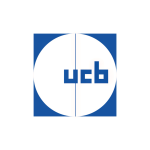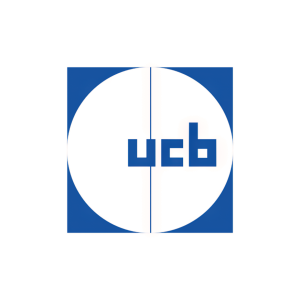Welcome to our dedicated page for Ucb S A news (Ticker: UCBJY), a resource for investors and traders seeking the latest updates and insights on Ucb S A stock.
UCB S A (UCBJY) is a global biopharmaceutical leader developing transformative therapies for severe immune system and central nervous system disorders. This page provides investors and healthcare professionals with direct access to official company announcements, clinical trial updates, and regulatory developments.
Stay informed about UCB's groundbreaking research through timely updates on product approvals, partnership agreements, and scientific presentations. Our curated news feed includes earnings reports, pipeline advancements, and strategic initiatives that demonstrate UCB's commitment to addressing unmet medical needs.
Key content categories include:
- Clinical trial results for novel therapies like BIMZELX and FINTEPLA
- Regulatory milestones across global markets
- Financial performance updates and strategic investments
- Research collaborations advancing immunology and neurology treatments
Bookmark this page for streamlined access to UCB's verified news stream. For comprehensive analysis of how these developments impact long-term growth strategies, consult your financial advisor.
UCB (OTC:UCBJY) has expanded its "Get Yourself Back" direct-to-consumer campaign for BIMZELX® (bimekizumab-bkzx), targeting the hidradenitis suppurativa (HS) community. BIMZELX, approved in November 2024, is the first and only treatment for moderate-to-severe HS that specifically targets IL-17A and IL-17F cytokines.
The campaign features clinical data showing 48-52% of BIMZELX-treated patients achieved at least a 50% reduction in inflamed nodules and abscesses at 16 weeks, compared to 29-32% for placebo. The initiative includes TV commercials with real patients, educational resources, and the BIMZELX Navigate® support program offering dedicated nurse navigators for prescribed patients.
UCB (OTC:UCBJY) announced positive Phase 3 study results for fenfluramine in treating CDKL5 deficiency disorder (CDD), an ultra-rare developmental and epileptic encephalopathy. The study met its primary endpoint of reducing countable motor seizure frequency and most key secondary endpoints.
The randomized, double-blind trial involved 87 patients aged 1-35 with CDD diagnosis and uncontrolled seizures. CDD affects approximately 1 in 40,000 to 60,000 live births. The drug demonstrated a safety profile consistent with previous studies in Dravet syndrome and Lennox-Gastaut syndrome. UCB plans to pursue regulatory approval for this potential new treatment option.
UCB (UCBJY) and Domino Data Lab have announced a strategic collaboration to modernize Statistical Computing Environment (SCE) for life sciences. The partnership aims to create a unified cloud-enabled platform that integrates analytical tools like SAS, R, and Python while maintaining compliance with GxP, FDA 21 CFR Part 11, and GDPR standards.
The modernized SCE will enhance research capabilities by embedding critical metadata and workflow management for searchable data re-use, supporting UCB's scientific innovation strategy. The platform will combine Domino's cloud expertise with UCB's clinical research knowledge to accelerate drug development and enable more efficient clinical studies through advanced data analysis.
UCB (UCBJY) announced the presentation of 24 scientific abstracts at the American Academy of Neurology (AAN) meeting in San Diego, April 5-9, 2025. The research focuses on treatments for rare epilepsies (Dravet syndrome and Lennox-Gastaut syndrome), generalized myasthenia gravis (gMG), and thymidine kinase 2 deficiency (TK2d).
Key presentations include:
- Final long-term safety data for fenfluramine (FINTEPLA) in Lennox-Gastaut syndrome
- Results from rozanolixizumab (RYSTIGGO) self-administration study in gMG
- Zilucoplan (ZILBRYSQ) Phase 3 study outcomes in gMG
- Disease course data from the largest international TK2d dataset
- BRIVIACT long-term clinical outcomes in pediatric patients
- Investigation of STACCATO alprazolam for seizure management
The company will also host its inaugural US Rare Disease Connect in Neurology Annual Summit and two symposia focusing on epileptic encephalopathy and seizure emergencies.
UCB presented positive clinical data for its investigational therapy doxecitine (dC) and doxribtimine (dT) for treating thymidine kinase 2 deficiency (TK2d) at the MDA Conference 2025. The data demonstrated significant benefits in survival and motor function improvements.
Key findings show that in patients with symptom onset ≤12 years, treatment reduced death risk by 92-94% from symptom onset and 87-95% from treatment start. Additionally, 75% of patients regained at least one lost motor milestone, with 22.5% regaining four or more. Ventilatory support needs decreased, with 16.1% reducing usage and another 16.1% discontinuing support entirely.
The therapy was generally well-tolerated, with diarrhea (84.6%-90.9%) being the most common side effect. The treatment is currently under review by US FDA and EMA regulators.
UCB announced the publication of final analysis results from a long-term open-label extension study of FINTEPLA® (fenfluramine) in treating Dravet syndrome (DS) patients. The study demonstrated that FINTEPLA was generally well-tolerated with significant efficacy in reducing seizures.
Key findings include:
- 66.8% median reduction in monthly convulsive seizure frequency from baseline to end of study
- 64.2% of patients achieved ≥50% reduction in seizure frequency
- 20.3% median increase in seizure-free days
- Only 2.9% of patients discontinued due to adverse events
Common side effects included pyrexia, nasopharyngitis, and decreased appetite. Notably, no valvular heart disease or pulmonary arterial hypertension was observed. The study included both children and adults, with patients exposed to FINTEPLA for up to 3.5 years. Caregivers and investigators rated approximately 62% of patients as much/very much improved.


